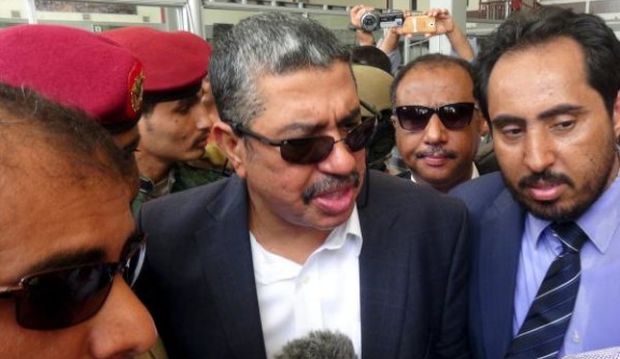
Yemen’s Vice President Khaled Bahah (C) speaks to reporters upon his arrival at Aden’s airport, Aden, Yemen, on August 1, 2015. (Reuters/Stringer)
Sana’a, Asharq Al-Awsat—Yemen’s exiled Vice President and Prime Minister Khaled Bahah returned to Yemen on Saturday for the first time since March, when he was placed under house arrest by Houthi rebels and then forced to flee the country.
“I aim to return to the country to liberate Aden and ensure that government services are operating,” Bahah said before departing to the Yemeni southern port city of Aden from Saudi Arabia, where he and his government have been in exile since March.
Spokesman for the Yemeni government Rageh Badie told Asharq Al-Awsat the one-day visit of Bahah, who is the most senior member of Yemen’s government to visit the newly liberated city in recent weeks, marked the “return to Aden of the country’s legitimate government.”
Aden was recently liberated by forces loyal to internationally recognized President Abd Rabbuh Mansur Hadi, who have been supported by Saudi-led airstrikes targeting the Houthis in Yemen. Several members of the cabinet including Transport Minister Badr Baslama have returned to the city to set up a rival power base to the Houthis’ in the capital Sana’a, which they have occupied since September 2014.
Speaking to Asharq Al-Awsat on Saturday, Basalma said Bahah aimed to “host meetings with members of the local government who operate in different locations in the city, with leaders of the resistance movement, and the army in order to present his gratitude for their political leadership, sacrifices, and efforts to halt the Iranian–Houthi influence that has lasted five months.”
Yemeni ministers had insisted Bahah should postpone his visit until the end of the week, to ensure security measures were tightened in the city, Basalma revealed. However Bahah “insisted on visiting Aden” and “was confident there were no security concerns.”
Bahah toured Aden and reviewed the destruction caused by months of fighting. Basalma said most of the city’s essential infrastructure had been destroyed and residents had also endured significant “psychological damage” due to the fighting, which has significantly affected everyday life in the city.
Pockets of Houthis resistance still remain on Aden’s outskirts despite the group’s recent defeat in the city. On Wednesday international NGO Human Rights Watch said Houthi militias had continually shelled residential areas in Aden throughout July, killing around 100 people—mostly civilians who included women and children.
Speaking of those injured in the attacks, Basalama said many would be transferred to Jordan for treatment on Monday and Tuesday, in coordination with The King Salman Center for Relief and Humanitarian Works.
Basalma said the center, founded this year by Saudi Arabia’s King Salman Bin Abdulaziz, would provide the entire financial coverage to treat around 600 Yemenis wounded in the conflict.
Yemen’s crisis began in September 2014 after the Houthis overran Sana’a. The group, backed by Iran and Yemen’s ousted former president Ali Abdullah Saleh, then launched a coup in February deposing President Hadi and Bahah’s government.
After being placed under house arrest by the group, both men eventually fled to Saudi Arabia where Hadi requested the Kingdom and its Arab allies intervene with military force against the Houthis. The Saudi-led campaign began on March 26.
